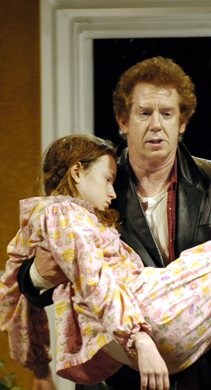
|
JOE EGG
|
|
|
|
JOE EGG
Comedy slices up pain By Mark Lowry / Star-Telegram A line in Peter Nichols' play Joe Egg observes the fallacy of the "sick joke": "It kills the pain but leaves the situation just as it was." In that case, there's a lot of painkilling in the 1967 work, originally titled A Day in the Death of Joe Egg. The effect on the audience, at least in Richard Hamburger's staging at the Dallas Theater Center, is unstoppable and often uncomfortable laughter. The title character is a severely disabled (multiplegic epileptic spastic) girl (nice, controlled work by young Dallas actress Clara Peretz). Her parents are amateur actor and optimist Sheila (Wendy Rich Stetson) and teacher and artist Bri (David Manis), who have given up their lives for Joe's care -- and it's wearing on them. The stress is such that they frequently step outside the play's action to tell their history and re-enact invented characters they've obviously revived many times. It's sort of a funhouse-mirror version (sans the alcohol) of Albee's George and Martha, except Bri and Sheila can only wish their child was imaginary. The second act turns especially riotous when they're joined by moneyed friends Freddie (James Crawford) and Pam (Jessica D. Turner) and Bri's busybody mother Grace (Sandra Shipley). Everyone gets at least one chance to break the fourth wall and reveal things about their characters. Pam's speech about being afraid of people who are N.P.A. (non-physically-attractive) is priceless, and Turner's performance is so absurd it feels dead on. (Actually, if all the characters do this and are aware when another is outside the action, is it breaking the fourth wall or just an additional layer of play?) Manis' caffeinated performance is nothing short of amazing. His Bri is so loopy that one wonders if he might not have been like this even if Joe had not been born. The other actors feed off this energy -- and discover their own -- beautifully. Buried deep in Joe Egg are serious thoughts -- euthanasia and murder, dreams deferred, divorce and, of course, Joe's condition (when Joe isn't onstage, scenic designer Michael Yeargan's detailed dollhouse reminds us of her presence). But as long as the comedy is so successfully slicing through the pain, why be grim? GRADE: A- |
|
© Richard Hamburger, Theater Director Site design and maintenance by Amy Lacy.
|



